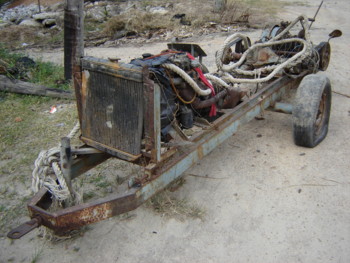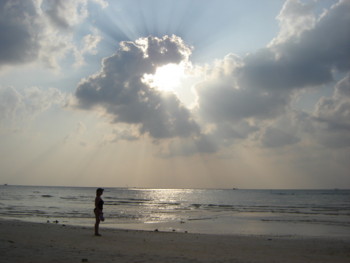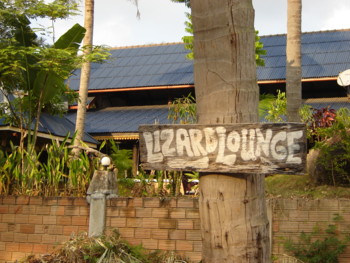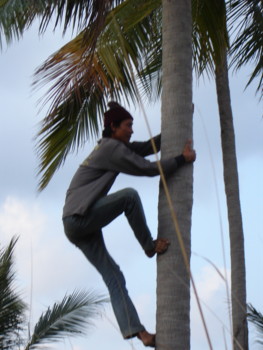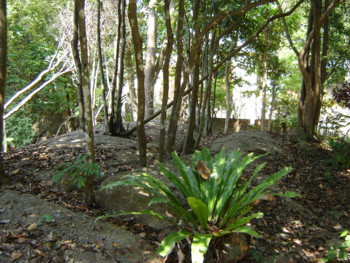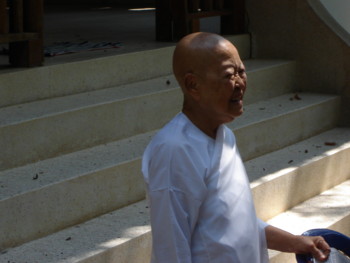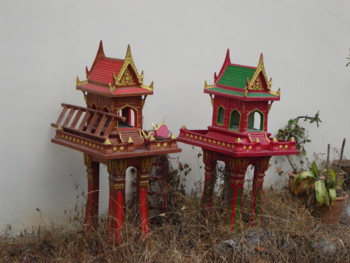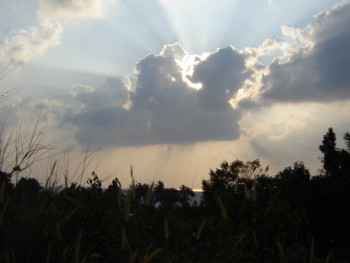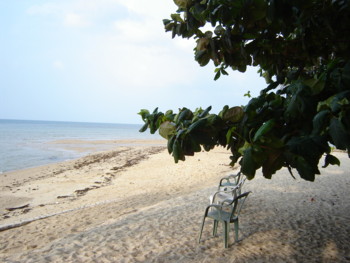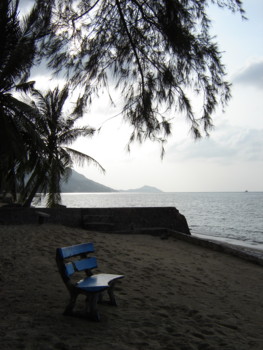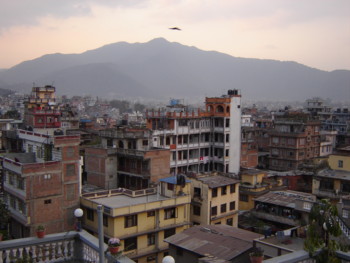 The long departure has begun. This trip will, if all goes well, end with me arriving home some 70 hours after leaving a guesthouse in Pokhara around 7:00 yesterday morning. That trip by bus to Kathmandu was supposed to take 6 hours but took 12, and it could have been more had my daughter and I stayed on the bus through the traffic jam in the outskirts of the capital beyond the final 3 hours, when we jumped ship in the company of a young Nepali man and his Spanish companion.
The long departure has begun. This trip will, if all goes well, end with me arriving home some 70 hours after leaving a guesthouse in Pokhara around 7:00 yesterday morning. That trip by bus to Kathmandu was supposed to take 6 hours but took 12, and it could have been more had my daughter and I stayed on the bus through the traffic jam in the outskirts of the capital beyond the final 3 hours, when we jumped ship in the company of a young Nepali man and his Spanish companion.
My daughter Nashira, thanks to her recent 8-month stint in India, had understood some of the man’s conversation in Hindi with another passenger who had got on nearer the beginning of the jam with some dozen other refugees from another bus that had caught fire from overheating. The gist of the situation was that we were likely to be stuck for an unspecified number of further hours before reaching our destination. The alternative was walking for twenty minutes or so, joining the steady stream of pedestrians who were bypassing the columns of stalled trucks and busses, to a point beyond the jam where we could take a taxi for the final half-hour of our journey. We set out like trekkers with our backpacks over the rubbly dirt trail - no matter that the dust and mud and trash composed the sidewalk and street of a major city.
 Earlier in the trip the trouble began when, halfway from Pokhara on a mountain curve, the front of the bus clipped the rear wheel of a motorcycle going the other way, passing too close. We heard a sickening bump and the bus came to a stop. As it happened the helmeted motorcyclist came out of it unhurt except for a scratch over his eye. But a lengthy harangue ensued, whereby blame was cast back and forth between the drivers of bus and motorbike, adjudicated by a growing crowd of motorists who had been stopped by the accident. Eventually police arrived on the scene, and taking the cyclist on board the bus, we proceeded to a nearby farm with a canopied table where the principals could hold their conclave at greater length, attended by the usual circle of interested onlookers.
Earlier in the trip the trouble began when, halfway from Pokhara on a mountain curve, the front of the bus clipped the rear wheel of a motorcycle going the other way, passing too close. We heard a sickening bump and the bus came to a stop. As it happened the helmeted motorcyclist came out of it unhurt except for a scratch over his eye. But a lengthy harangue ensued, whereby blame was cast back and forth between the drivers of bus and motorbike, adjudicated by a growing crowd of motorists who had been stopped by the accident. Eventually police arrived on the scene, and taking the cyclist on board the bus, we proceeded to a nearby farm with a canopied table where the principals could hold their conclave at greater length, attended by the usual circle of interested onlookers.
 These proceedings eventually drew to some unknown conclusion, and the bus was able to continue down the highway ... not without some further delays, however, here and there as traffic was stalled by parades of trucks and busses packed to the rooftops with crowds of red-clad youth supporting one of the two Communist parties (one Maoist and one more moderate) currently vying for power in the country’s first democratic election scheduled in a week’s time. At times our bus merged into the parade itself, and we felt visible as supporters as if by osmosis; at other times the marching youth pounded on the sides of the bus as we passed - it was uncertain whether out of exuberance or mounting defiance.
These proceedings eventually drew to some unknown conclusion, and the bus was able to continue down the highway ... not without some further delays, however, here and there as traffic was stalled by parades of trucks and busses packed to the rooftops with crowds of red-clad youth supporting one of the two Communist parties (one Maoist and one more moderate) currently vying for power in the country’s first democratic election scheduled in a week’s time. At times our bus merged into the parade itself, and we felt visible as supporters as if by osmosis; at other times the marching youth pounded on the sides of the bus as we passed - it was uncertain whether out of exuberance or mounting defiance.
Earlier on our trek among the Himalayan peaks, we had met a couple of UN officials stationed in country to help defuse the violence surrounding this historic occasion. The New Zealand delegate was here following stints in previous hotspots Afghanistan and Sierra Leone. Here in Nepal there had been, in addition to the simmering Maoist insurgency in parts of the country, daily attacks on competing parties, threats of revolution if victory was not won at the polls, and a host of assorted other conflicts set to break out after the election. It was a good time, we were assured, to be leaving the country. When I asked the New Zealander where his next posting would be, he smiled wearily and said hopefully, “New York.”
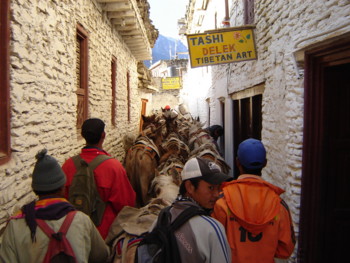 But could we leave? The streets and alleys of Kathmandu, like the mountain highways between cities, were roughly one-lane affairs even when paved. These single lanes had to accommodate not only two-way traffic of cars, buses, and trucks, but motorcycles weaving through them in even greater numbers, as well as bicycle-rickshaws, ordinary bicycles, and pedestrian traffic. People seemed to prefer walking on both sides of the pavement, or right in the middle, and blindly crossing at will, as if oblivious to the motorized madness that swirled past on all sides. Add to this human free-for-all the odd lazy water buffalo, frisky goats, black dogs in the night, random chickens, and everywhere a peasant of town or country bearing a great load on their back with a Sherpa-style head strap, bent to the task of centuries.
But could we leave? The streets and alleys of Kathmandu, like the mountain highways between cities, were roughly one-lane affairs even when paved. These single lanes had to accommodate not only two-way traffic of cars, buses, and trucks, but motorcycles weaving through them in even greater numbers, as well as bicycle-rickshaws, ordinary bicycles, and pedestrian traffic. People seemed to prefer walking on both sides of the pavement, or right in the middle, and blindly crossing at will, as if oblivious to the motorized madness that swirled past on all sides. Add to this human free-for-all the odd lazy water buffalo, frisky goats, black dogs in the night, random chickens, and everywhere a peasant of town or country bearing a great load on their back with a Sherpa-style head strap, bent to the task of centuries.
Our taxi driver for the final leg to the hotel that evening - like his brave comrade the following morning for the trip to the airport - was indeed able to navigate us somehow with sustained momentum through this chaos of streets. But after the accident with the motorcyclist, our innocence was no longer sustainable, and every near-miss (with a fresh challenge every foot of the way) was a real injury waiting to happen. Meanwhile at 10 A.M. the riot police, wielding long batons and clad in padded Ninja armor, were assembling on the street corners of the capital, awaiting street demonstrations that were already planned in reaction to some knifing incidents at election rallies the night before.
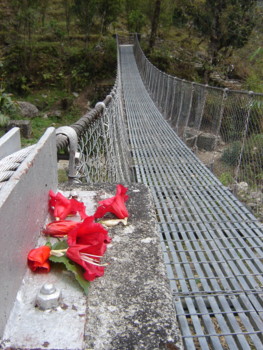 At the airport things were tamer, and more secure from our point of view, yet still strangely uncertain. There were no boarding announcements, no identifiable departure gates or flight numbers; just a generalized massing of people in exodus, eerily familiar to the previous evening’s populist migration on foot past the stalled dinosaurs of a passing age. It seemed that all departing passengers, several hundred in number, were to await our deliverance in a single holding room looking out onto the tarmac. At the appearance and unintelligible utterance of a blue-clad woman near the front, half of those in the room leaped to their feet and rushed at a side door. I got up, hugged my daughter good-bye, and joined them. Asserting my way bodily toward the door with my boarding pass, I was informed by the woman in blue that this flight was not mine; I would have to wait in a smaller room in front of the holding area. There a mere hundred of us waited another twenty minutes in palpable anxiety - the anxiety of simply not knowing by any familiar or visible sign how or when our fate - actual departure - would be accomplished. Finally when a transit bus next appeared outside our room, people rose and headed for the door: the simple action of departure serving to signify itself.
At the airport things were tamer, and more secure from our point of view, yet still strangely uncertain. There were no boarding announcements, no identifiable departure gates or flight numbers; just a generalized massing of people in exodus, eerily familiar to the previous evening’s populist migration on foot past the stalled dinosaurs of a passing age. It seemed that all departing passengers, several hundred in number, were to await our deliverance in a single holding room looking out onto the tarmac. At the appearance and unintelligible utterance of a blue-clad woman near the front, half of those in the room leaped to their feet and rushed at a side door. I got up, hugged my daughter good-bye, and joined them. Asserting my way bodily toward the door with my boarding pass, I was informed by the woman in blue that this flight was not mine; I would have to wait in a smaller room in front of the holding area. There a mere hundred of us waited another twenty minutes in palpable anxiety - the anxiety of simply not knowing by any familiar or visible sign how or when our fate - actual departure - would be accomplished. Finally when a transit bus next appeared outside our room, people rose and headed for the door: the simple action of departure serving to signify itself.
Nepal: People Watching
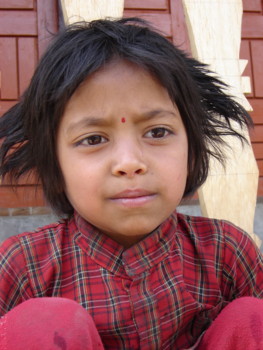 Standing by the side of the road
Standing by the side of the road
watching the world go by
shopkeepers, an old man cross-legged
a group of five teen boys
a woman in sari and shawl
what are they waiting for -
why are they looking at me -
passing in the tourist bus -
also doing nothing
but watching people
not working, not in meditation
not really waiting for anything
just watching the world go by
Trekking: flashback
(guest blogger: Nashira Birch)
 I know that everyone "absolutely loves" Nepal, so I feel unoriginal in saying it, but Nepal truly is an incredible place. The landscape, I think it goes without saying, is as stunning as it is diverse. The culture and people are also incredibly diverse and stunning, as well as calm and welcoming. Sometimes I forget that I'm not in India because Nepal is so similar in so many ways, and India has become such a big part of my reality.... But Nepal is kind of like an India in which someone has turned down the intensity meter. Clearly, in the mountains and villages where most of my Nepal experience has taken place, the contrast to Jaipur's chaotic intensity would stand out, but I feel even in the most intense parts of Kathmandu people generally seem laid-back, relaxed, and happy. Luckily for me, Nepali is very similar to Hindi, which has helped in meeting people (having them laugh that I speak Hindi, which most people here learn from television) and finding our way. It is an interesting time to be in Nepal, however, and there is a lot more going on than the postcards tell you.
I know that everyone "absolutely loves" Nepal, so I feel unoriginal in saying it, but Nepal truly is an incredible place. The landscape, I think it goes without saying, is as stunning as it is diverse. The culture and people are also incredibly diverse and stunning, as well as calm and welcoming. Sometimes I forget that I'm not in India because Nepal is so similar in so many ways, and India has become such a big part of my reality.... But Nepal is kind of like an India in which someone has turned down the intensity meter. Clearly, in the mountains and villages where most of my Nepal experience has taken place, the contrast to Jaipur's chaotic intensity would stand out, but I feel even in the most intense parts of Kathmandu people generally seem laid-back, relaxed, and happy. Luckily for me, Nepali is very similar to Hindi, which has helped in meeting people (having them laugh that I speak Hindi, which most people here learn from television) and finding our way. It is an interesting time to be in Nepal, however, and there is a lot more going on than the postcards tell you.
 After a few postponed election dates due to political instabilities, a historically significant election is fast approaching (countdown: 8 days). Even far into the hills, communist party sickles and hammers adorn rocks, walls, and small flags and marches. Now, in the small city of Pokhara, every political party is "politicking" (in my dad's words), with slow-moving vehicles blaring music, loudspeaker announcements and slogans, flags, banners, and even a lively motorcycle brigade. UN vehicles meander the streets, trying to ensure everything goes smoothly over the next month or so (apparently it will take more than three weeks for the results to be released).
After a few postponed election dates due to political instabilities, a historically significant election is fast approaching (countdown: 8 days). Even far into the hills, communist party sickles and hammers adorn rocks, walls, and small flags and marches. Now, in the small city of Pokhara, every political party is "politicking" (in my dad's words), with slow-moving vehicles blaring music, loudspeaker announcements and slogans, flags, banners, and even a lively motorcycle brigade. UN vehicles meander the streets, trying to ensure everything goes smoothly over the next month or so (apparently it will take more than three weeks for the results to be released).  Anyway, the hiking: My dad and I "headed for the hills," as he put it, pretty much as soon as we could, and our lungs were thankful for the move from Kathmandu (Delhi may be one of the most polluted cities in the world, but they have gone strides beyond Kathmandu in terms of their use of clean energy and control of vehicle pollution). We did half of the Annapurna circuit trek, climbing through the most stunning and diverse landscapes (and moonscapes), I have ever been witness to. Every day held new surprises, new ecosystems, new views, new stunning peaks suddenly appearing above the clouds. We started our hike though steep hills terraced by rice, barley, and maize fields and scattered with small villages of stone houses. We climbed at least 3000 stone steps up over 2 days, and at least that many down again the next day. I thought I was young and healthy enough to overcome my lack of exercise over the past year ... my knees, however, having not seen so much as a hill in the past year of living in the desert, had different ideas.... Luckily, we landed in a village built around hot springs on the river.
Anyway, the hiking: My dad and I "headed for the hills," as he put it, pretty much as soon as we could, and our lungs were thankful for the move from Kathmandu (Delhi may be one of the most polluted cities in the world, but they have gone strides beyond Kathmandu in terms of their use of clean energy and control of vehicle pollution). We did half of the Annapurna circuit trek, climbing through the most stunning and diverse landscapes (and moonscapes), I have ever been witness to. Every day held new surprises, new ecosystems, new views, new stunning peaks suddenly appearing above the clouds. We started our hike though steep hills terraced by rice, barley, and maize fields and scattered with small villages of stone houses. We climbed at least 3000 stone steps up over 2 days, and at least that many down again the next day. I thought I was young and healthy enough to overcome my lack of exercise over the past year ... my knees, however, having not seen so much as a hill in the past year of living in the desert, had different ideas.... Luckily, we landed in a village built around hot springs on the river.
 As we made our way along this river up the valley over the coming week, we hiked through the deepest valley in the world, and meandered along the narrow alleyways and prayer wheels of windswept medieval villages huddled into the hillside and topped by Buddhist monasteries and Buddhist-Hindu-fusion temples. The 6000, 7000, and 8000-meter peaks that appeared during the clear morning hours towered above us as we made our way toward Tibet through what was now a moonscape of bald hills and river beds and driving winds. It turns out the upper part of this valley (the Upper Mustang), which nestles its way into Tibet, costs $700 US just to enter for 10 days. We turned around here, and made our way back down the valley.
As we made our way along this river up the valley over the coming week, we hiked through the deepest valley in the world, and meandered along the narrow alleyways and prayer wheels of windswept medieval villages huddled into the hillside and topped by Buddhist monasteries and Buddhist-Hindu-fusion temples. The 6000, 7000, and 8000-meter peaks that appeared during the clear morning hours towered above us as we made our way toward Tibet through what was now a moonscape of bald hills and river beds and driving winds. It turns out the upper part of this valley (the Upper Mustang), which nestles its way into Tibet, costs $700 US just to enter for 10 days. We turned around here, and made our way back down the valley.
We are now resting in Pokhara in between espressos and Tibetan soup and thunderstorms, waiting for our journey back to Kathmandu, and re-entering the deja vu that, it would seem, is the traveler’s bubble everywhere in the backpacker world (not to say the trail was completely devoid of this: I definitely - guiltily - had a Mexican enchilada about 5 days in!). You have your German bakeries, your banana pancakes, your Israeli salads, your endless strips of shops selling the same souvenirs, the same travelling pants (if you've been anywhere in Asia, you know the ones I’m talking about ... the MC Hammer ones), and the same Buddha miniatures. In Nepal, you also have endless shops chock full of North Face rip-offs. In India, the travelers go from place to place, almost never leaving this bubble. In a sense, sometimes I feel like people have only left home for the travelling culture, not for the Indian culture.
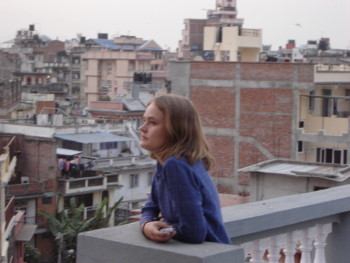
photo gallery: Nepal Himalaya Trek (Annapurna Circuit)
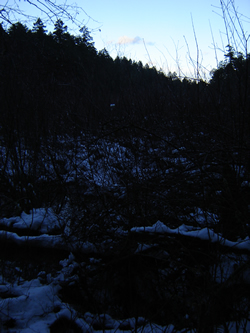


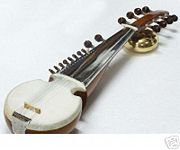 This ecstasy just won’t go away. In fact it’s building, building on itself and everything that has gone before. It is the coming of synchronicity as the norm, where you can’t get away from the interconnectedness of everyone and everything, no matter what you do or don’t do; yet in responding to the currents around you and within you naturally, like the 95% improvised classical Indian music concert tonight with tabla and sarod, you find that all choices are right, and the flow has carried you over 24 hours and more to your friend on the boat to give him the final push of recognition and acknowledgement of his own true genius, and in being there you recognize also the beauty of the bubble of the boat and its presence in the real world, i.e., the ocean ... and not only that but realizing that better than a swim in an artificial pool back in the city is a detour on the way home, to the summer swimming church where even today in late November the parking lot above the trail is full, and down by the water the sunny bluffs are taken with people sitting in homage, and there you find your spot before the shimmering silvery wavelets, and the luminous green moss, and the living rocks, and find your peace and stillness and knowing and oneness in presence of all this, and still it continues back up the trail on an ankle now suddenly free and healed, winged at heel ... on to town just in time for group practice, where again the immersion in music and waves has given you that frequency to hold, and it’s so big and so deep that everything is allowed, accepted into it, yet it’s also tight and focussed and dedicated enough to dance with clear measure in concert with the others, and of course now without effort, but simply attention and more knowing, and with that - but not too much - your eyes can close again for a moment and you can drift with it where it wants to go, and it drifts you where you want to go, which is everything in that ongoing flow ... so to the university where you zone out and refresh for ten minutes and then go to greet your friends there waiting, not only the two you were expecting but a handful more, and all saying midway between sets that we should have known to bring our other friends there, to share in that moment of joined creation.
This ecstasy just won’t go away. In fact it’s building, building on itself and everything that has gone before. It is the coming of synchronicity as the norm, where you can’t get away from the interconnectedness of everyone and everything, no matter what you do or don’t do; yet in responding to the currents around you and within you naturally, like the 95% improvised classical Indian music concert tonight with tabla and sarod, you find that all choices are right, and the flow has carried you over 24 hours and more to your friend on the boat to give him the final push of recognition and acknowledgement of his own true genius, and in being there you recognize also the beauty of the bubble of the boat and its presence in the real world, i.e., the ocean ... and not only that but realizing that better than a swim in an artificial pool back in the city is a detour on the way home, to the summer swimming church where even today in late November the parking lot above the trail is full, and down by the water the sunny bluffs are taken with people sitting in homage, and there you find your spot before the shimmering silvery wavelets, and the luminous green moss, and the living rocks, and find your peace and stillness and knowing and oneness in presence of all this, and still it continues back up the trail on an ankle now suddenly free and healed, winged at heel ... on to town just in time for group practice, where again the immersion in music and waves has given you that frequency to hold, and it’s so big and so deep that everything is allowed, accepted into it, yet it’s also tight and focussed and dedicated enough to dance with clear measure in concert with the others, and of course now without effort, but simply attention and more knowing, and with that - but not too much - your eyes can close again for a moment and you can drift with it where it wants to go, and it drifts you where you want to go, which is everything in that ongoing flow ... so to the university where you zone out and refresh for ten minutes and then go to greet your friends there waiting, not only the two you were expecting but a handful more, and all saying midway between sets that we should have known to bring our other friends there, to share in that moment of joined creation.

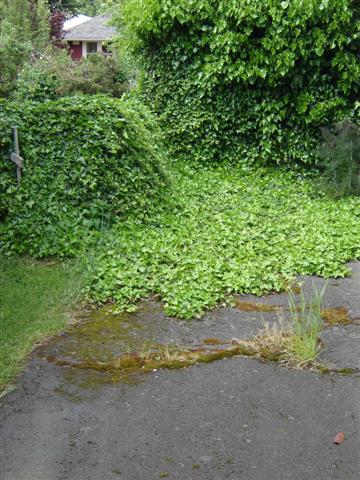 In the moment, this is spiritual practice. That is, it can be if I let it, if I intend so. It can be also relationship if you let it, if you receive this intention. In the moment there is no emotion but the moment of breathing. Are you at war with feeling? No, if you listen to the body. The body tells you what it needs. Really what it needs is relaxed breathing - fast, for exercise, or slow, for meditation. In relationship, there is also a matching of breath, a harmonizing of intention, a lifting of awareness from the single body to the dual body, to the all-body of love still greater than one or two.Still, your focus begins with one. One love, inside, from inside, healing first the wholeness of self, freeing the feelings of past hurt and success to flow into and out of present time through the breathing body, the very form of time. Did I say “healing success”? Yes, if success is the wound that takes a toll through stress and imbalance, compromising health for one-dimensional rewards. Pride used to be called a sin. Was that just church propaganda? It’s really just logic when the body’s inevitable demise is accounted for. The fall of pride is simply inescapable reality. Therefore to remain within the boundary of pride is to hide in denial. On the other hand a balance of pride and humility is only natural: a reflection of life’s urgency for full potential while the time is ripe.
In the moment, this is spiritual practice. That is, it can be if I let it, if I intend so. It can be also relationship if you let it, if you receive this intention. In the moment there is no emotion but the moment of breathing. Are you at war with feeling? No, if you listen to the body. The body tells you what it needs. Really what it needs is relaxed breathing - fast, for exercise, or slow, for meditation. In relationship, there is also a matching of breath, a harmonizing of intention, a lifting of awareness from the single body to the dual body, to the all-body of love still greater than one or two.Still, your focus begins with one. One love, inside, from inside, healing first the wholeness of self, freeing the feelings of past hurt and success to flow into and out of present time through the breathing body, the very form of time. Did I say “healing success”? Yes, if success is the wound that takes a toll through stress and imbalance, compromising health for one-dimensional rewards. Pride used to be called a sin. Was that just church propaganda? It’s really just logic when the body’s inevitable demise is accounted for. The fall of pride is simply inescapable reality. Therefore to remain within the boundary of pride is to hide in denial. On the other hand a balance of pride and humility is only natural: a reflection of life’s urgency for full potential while the time is ripe.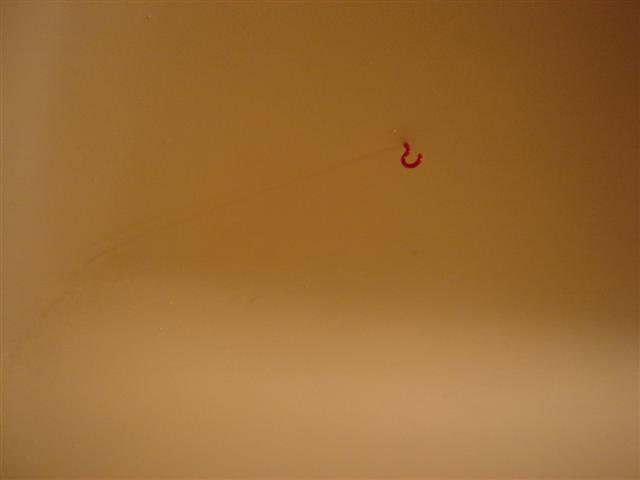 You come back to present feeling. Are you feeling lonely, unwanted, weak, depressed? These are all conditional, and can be breathed away into the past from which they originated, or the future which is so feared or misunderstood. Are you feeling gladness and joy, anticipation and relief? Fine, while realizing also that these things if dependent on temporary causes, will pass away with the changing winds of time. If rather independent, or arising from life itself - gladness for the fresh breeze off the ocean, joy at seeing friends in a few minutes, anticipation over the promise tomorrow holds, relief in the overcoming of obstacles - these feelings are not yours because of personal circumstances, but rather scents of life itself, lent to you for the savoring.The practice is the remembering, or the means of remembering, that there is more to life than your present feelings and preoccupations. Beyond your current emotional state is communion with others, sharing and harmonizing feelings you all have; and beyond and below this ground of relationship is the ground of being itself, which connects each of you not only to each other, but also to your more central self, the body breathing free, the soul liberated to larger life and the emotion of such liberation.
You come back to present feeling. Are you feeling lonely, unwanted, weak, depressed? These are all conditional, and can be breathed away into the past from which they originated, or the future which is so feared or misunderstood. Are you feeling gladness and joy, anticipation and relief? Fine, while realizing also that these things if dependent on temporary causes, will pass away with the changing winds of time. If rather independent, or arising from life itself - gladness for the fresh breeze off the ocean, joy at seeing friends in a few minutes, anticipation over the promise tomorrow holds, relief in the overcoming of obstacles - these feelings are not yours because of personal circumstances, but rather scents of life itself, lent to you for the savoring.The practice is the remembering, or the means of remembering, that there is more to life than your present feelings and preoccupations. Beyond your current emotional state is communion with others, sharing and harmonizing feelings you all have; and beyond and below this ground of relationship is the ground of being itself, which connects each of you not only to each other, but also to your more central self, the body breathing free, the soul liberated to larger life and the emotion of such liberation.
 What Wordsworth expressed in his poetry were the kind of feelings I would call transpersonal: those feelings of communion with nature and with people who live as integral parts of the natural fabric. And in music, again (which is a form of natural energy) it is possible to access states of feeling that are beyond the realm of simply personal experience. In fact I would say that it is only when we are free from the grip of personal emotions such as lust and affection or anger and jealously, that we can be open enough to receive the transpersonal emotions such as compassion or righteous indignation (think Jesus vs. the moneylenders, or Martin Luther King, Jr., or more recently, Congressman Dennis Kucinich with his fiery speech to the 2008 Democratic Convention,
What Wordsworth expressed in his poetry were the kind of feelings I would call transpersonal: those feelings of communion with nature and with people who live as integral parts of the natural fabric. And in music, again (which is a form of natural energy) it is possible to access states of feeling that are beyond the realm of simply personal experience. In fact I would say that it is only when we are free from the grip of personal emotions such as lust and affection or anger and jealously, that we can be open enough to receive the transpersonal emotions such as compassion or righteous indignation (think Jesus vs. the moneylenders, or Martin Luther King, Jr., or more recently, Congressman Dennis Kucinich with his fiery speech to the 2008 Democratic Convention,  Polarity: the fullness of ideas, plans, projects and projections, under natural influence; vs. the simple emptiness of reality, unclouded ... unecstatic except by a finer more subtle clarity, and moved deeper not by karmic fear but by opening to the way it is.On the side of the Dreamer and the Dreamed, you come to the knowing that this is a horizontal evolution, the single phase gathering charge to a series of sparks to come, a dreaming into play by dreaming your way full of your way, and yet empty. When this polarity is complete, and the fullness and the emptiness dance in clear union, within as without, the union is whole and thus ready for re-union with another such whole. Otherwise the imbalanced fullness/emptiness, whether too vain or too humble, too busy or too lazy, too pushy or too laid-back, presents a flawed match to another except by complementary co-dependence - where each seeks the primary union still and tries to fit the other into it. In the balanced re-union of two whole, internally balanced unions, is a higher order of duality dancing together.The above model might be criticized, however, as idealistically androgenous. A person with yin and yang 50/50 is perhaps not likely going to be as sexy as one who is “all man” or “all woman.” Yet maybe gender attraction doesn’t depend on a balance of fullness/emptiness, which has more to do with the spiritual side of yang/yin than the erotic side. What we might idealize is a partnership of two spiritually balanced, ego-neutral individuals who nevertheless are attracted to complementary physical and personality traits in one another.-----------------While you grow and balance and gather charge in this phase of singlehood, you recollect that you also received gifts and lessons along the way of previous phases of relationship, and in each case came to an end of the positive learning environment. Maybe it goes back to the problems above, regarding imperfect unions, the flawed attempt to complete with another what is not yet complete in oneself. In any case the experimental union finally dissolved or fractured, or you might say became transformed, in a kind of quantum leap to the next level of learning, in the next relationship or phase of singlehood.How is it assumed that the “jump” to the next classroom is vertical and not just through the garden gate, so to speak? And what is to say that we are moving at all? Maybe it is simply a succession of experiences and people coming to us, to cohabit the world we call ours.Again, in either case, I believe the learning is cumulative. We do repeat mistakes, and develop strange habits of bouncing between the same kinds of obstacles or kinds of mismatch, if we are slow learners who do not reflect and choose otherwise. Eventually we get what it is we need to survive each step, each test, each challenge and opportunity. Or we don’t survive, and that brings us to a whole new territory.Again, you might say this life has been just another larger phase, and after a time of grieving, and taking stock, and then paying dues or taking a vacation, you might try your luck again. Maybe as the other gender this time . . .--------------------------Between the polarity and the dreaming, when the stillness has cleared and the dreamer and the dream are one, shines the nurturing grace of Imix, the divine chalice and holy grail, the all-embracing Source. She doesn’t require these conditions of balance and equilibrium to offer her love and forgiveness. She gave life and she will receive it back again, without prejudice.So let polarity flash through the night; let the dreamers have their dream awhile. You will find your way home one day, dead or alive. Or she will come to you . . . if you are not too vain, busy, or pushy; too humble, lazy, or laid-back to receive her.--
Polarity: the fullness of ideas, plans, projects and projections, under natural influence; vs. the simple emptiness of reality, unclouded ... unecstatic except by a finer more subtle clarity, and moved deeper not by karmic fear but by opening to the way it is.On the side of the Dreamer and the Dreamed, you come to the knowing that this is a horizontal evolution, the single phase gathering charge to a series of sparks to come, a dreaming into play by dreaming your way full of your way, and yet empty. When this polarity is complete, and the fullness and the emptiness dance in clear union, within as without, the union is whole and thus ready for re-union with another such whole. Otherwise the imbalanced fullness/emptiness, whether too vain or too humble, too busy or too lazy, too pushy or too laid-back, presents a flawed match to another except by complementary co-dependence - where each seeks the primary union still and tries to fit the other into it. In the balanced re-union of two whole, internally balanced unions, is a higher order of duality dancing together.The above model might be criticized, however, as idealistically androgenous. A person with yin and yang 50/50 is perhaps not likely going to be as sexy as one who is “all man” or “all woman.” Yet maybe gender attraction doesn’t depend on a balance of fullness/emptiness, which has more to do with the spiritual side of yang/yin than the erotic side. What we might idealize is a partnership of two spiritually balanced, ego-neutral individuals who nevertheless are attracted to complementary physical and personality traits in one another.-----------------While you grow and balance and gather charge in this phase of singlehood, you recollect that you also received gifts and lessons along the way of previous phases of relationship, and in each case came to an end of the positive learning environment. Maybe it goes back to the problems above, regarding imperfect unions, the flawed attempt to complete with another what is not yet complete in oneself. In any case the experimental union finally dissolved or fractured, or you might say became transformed, in a kind of quantum leap to the next level of learning, in the next relationship or phase of singlehood.How is it assumed that the “jump” to the next classroom is vertical and not just through the garden gate, so to speak? And what is to say that we are moving at all? Maybe it is simply a succession of experiences and people coming to us, to cohabit the world we call ours.Again, in either case, I believe the learning is cumulative. We do repeat mistakes, and develop strange habits of bouncing between the same kinds of obstacles or kinds of mismatch, if we are slow learners who do not reflect and choose otherwise. Eventually we get what it is we need to survive each step, each test, each challenge and opportunity. Or we don’t survive, and that brings us to a whole new territory.Again, you might say this life has been just another larger phase, and after a time of grieving, and taking stock, and then paying dues or taking a vacation, you might try your luck again. Maybe as the other gender this time . . .--------------------------Between the polarity and the dreaming, when the stillness has cleared and the dreamer and the dream are one, shines the nurturing grace of Imix, the divine chalice and holy grail, the all-embracing Source. She doesn’t require these conditions of balance and equilibrium to offer her love and forgiveness. She gave life and she will receive it back again, without prejudice.So let polarity flash through the night; let the dreamers have their dream awhile. You will find your way home one day, dead or alive. Or she will come to you . . . if you are not too vain, busy, or pushy; too humble, lazy, or laid-back to receive her.--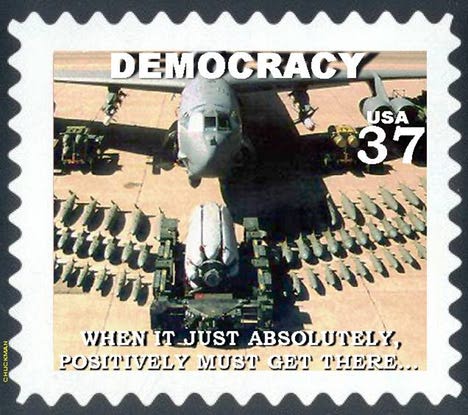 How strange it will be now to suddenly broadcast to the world hope instead of fear, good sense instead of subtrefuge, brave intelligence instead of willful ignorance. This “Barack Revolution” will surely give other global powers pause. Will this emperor effectively turn his country from a rapacious bogeyman to a humane republic? That might be too much to ask of a country founded and weaned on conquest, genocide, and slavery. Yet the magnitude of today’s leap from slavery conveys at least an awakening of a people to outward embrace, beyond narrow bounds of race, color, creed or even, we might imagine, nationality. Is America, so quickly united, so quickly ready also to open its arms to the diversity watching with cautious optimism from beyond its borders?
How strange it will be now to suddenly broadcast to the world hope instead of fear, good sense instead of subtrefuge, brave intelligence instead of willful ignorance. This “Barack Revolution” will surely give other global powers pause. Will this emperor effectively turn his country from a rapacious bogeyman to a humane republic? That might be too much to ask of a country founded and weaned on conquest, genocide, and slavery. Yet the magnitude of today’s leap from slavery conveys at least an awakening of a people to outward embrace, beyond narrow bounds of race, color, creed or even, we might imagine, nationality. Is America, so quickly united, so quickly ready also to open its arms to the diversity watching with cautious optimism from beyond its borders? When I have returned back home from winter travels to exotic lands, usually the camera goes back in the closet, and my journalistic streak goes into a prolonged funk. Without fresh inspiration from the outer world, what can the inner creative spirit latch onto?
When I have returned back home from winter travels to exotic lands, usually the camera goes back in the closet, and my journalistic streak goes into a prolonged funk. Without fresh inspiration from the outer world, what can the inner creative spirit latch onto? 
 In this enterprise I begin - as it is said in the Buddhist art of
In this enterprise I begin - as it is said in the Buddhist art of 

 Following that amble through the passing paradise of the “backyard” moment on a classic spring day, my camera is back in the closet and I sit with a somewhat dutiful comportment at my keyboard to share this not-really-traveling slice of life to a travel-habituated audience. Yet the depth of my single experience here - putting on fresh eyes in a familiar land - lingers, pausing my breath.
Following that amble through the passing paradise of the “backyard” moment on a classic spring day, my camera is back in the closet and I sit with a somewhat dutiful comportment at my keyboard to share this not-really-traveling slice of life to a travel-habituated audience. Yet the depth of my single experience here - putting on fresh eyes in a familiar land - lingers, pausing my breath. 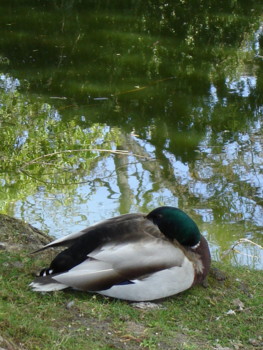
 The long departure has begun. This trip will, if all goes well, end with me arriving home some 70 hours after leaving a guesthouse in Pokhara around 7:00 yesterday morning. That trip by bus to Kathmandu was supposed to take 6 hours but took 12, and it could have been more had my daughter and I stayed on the bus through the traffic jam in the outskirts of the capital beyond the final 3 hours, when we jumped ship in the company of a young Nepali man and his Spanish companion.
The long departure has begun. This trip will, if all goes well, end with me arriving home some 70 hours after leaving a guesthouse in Pokhara around 7:00 yesterday morning. That trip by bus to Kathmandu was supposed to take 6 hours but took 12, and it could have been more had my daughter and I stayed on the bus through the traffic jam in the outskirts of the capital beyond the final 3 hours, when we jumped ship in the company of a young Nepali man and his Spanish companion.  Earlier in the trip the trouble began when, halfway from Pokhara on a mountain curve, the front of the bus clipped the rear wheel of a motorcycle going the other way, passing too close. We heard a sickening bump and the bus came to a stop. As it happened the helmeted motorcyclist came out of it unhurt except for a scratch over his eye. But a lengthy harangue ensued, whereby blame was cast back and forth between the drivers of bus and motorbike, adjudicated by a growing crowd of motorists who had been stopped by the accident. Eventually police arrived on the scene, and taking the cyclist on board the bus, we proceeded to a nearby farm with a canopied table where the principals could hold their conclave at greater length, attended by the usual circle of interested onlookers.
Earlier in the trip the trouble began when, halfway from Pokhara on a mountain curve, the front of the bus clipped the rear wheel of a motorcycle going the other way, passing too close. We heard a sickening bump and the bus came to a stop. As it happened the helmeted motorcyclist came out of it unhurt except for a scratch over his eye. But a lengthy harangue ensued, whereby blame was cast back and forth between the drivers of bus and motorbike, adjudicated by a growing crowd of motorists who had been stopped by the accident. Eventually police arrived on the scene, and taking the cyclist on board the bus, we proceeded to a nearby farm with a canopied table where the principals could hold their conclave at greater length, attended by the usual circle of interested onlookers. These proceedings eventually drew to some unknown conclusion, and the bus was able to continue down the highway ... not without some further delays, however, here and there as traffic was stalled by parades of trucks and busses packed to the rooftops with crowds of red-clad youth supporting one of the two Communist parties (one Maoist and one more moderate) currently vying for power in the country’s first democratic election scheduled in a week’s time. At times our bus merged into the parade itself, and we felt visible as supporters as if by osmosis; at other times the marching youth pounded on the sides of the bus as we passed - it was uncertain whether out of exuberance or mounting defiance.
These proceedings eventually drew to some unknown conclusion, and the bus was able to continue down the highway ... not without some further delays, however, here and there as traffic was stalled by parades of trucks and busses packed to the rooftops with crowds of red-clad youth supporting one of the two Communist parties (one Maoist and one more moderate) currently vying for power in the country’s first democratic election scheduled in a week’s time. At times our bus merged into the parade itself, and we felt visible as supporters as if by osmosis; at other times the marching youth pounded on the sides of the bus as we passed - it was uncertain whether out of exuberance or mounting defiance.  But could we leave? The streets and alleys of Kathmandu, like the mountain highways between cities, were roughly one-lane affairs even when paved. These single lanes had to accommodate not only two-way traffic of cars, buses, and trucks, but motorcycles weaving through them in even greater numbers, as well as bicycle-rickshaws, ordinary bicycles, and pedestrian traffic. People seemed to prefer walking on both sides of the pavement, or right in the middle, and blindly crossing at will, as if oblivious to the motorized madness that swirled past on all sides. Add to this human free-for-all the odd lazy water buffalo, frisky goats, black dogs in the night, random chickens, and everywhere a peasant of town or country bearing a great load on their back with a Sherpa-style head strap, bent to the task of centuries.
But could we leave? The streets and alleys of Kathmandu, like the mountain highways between cities, were roughly one-lane affairs even when paved. These single lanes had to accommodate not only two-way traffic of cars, buses, and trucks, but motorcycles weaving through them in even greater numbers, as well as bicycle-rickshaws, ordinary bicycles, and pedestrian traffic. People seemed to prefer walking on both sides of the pavement, or right in the middle, and blindly crossing at will, as if oblivious to the motorized madness that swirled past on all sides. Add to this human free-for-all the odd lazy water buffalo, frisky goats, black dogs in the night, random chickens, and everywhere a peasant of town or country bearing a great load on their back with a Sherpa-style head strap, bent to the task of centuries.  At the airport things were tamer, and more secure from our point of view, yet still strangely uncertain. There were no boarding announcements, no identifiable departure gates or flight numbers; just a generalized massing of people in exodus, eerily familiar to the previous evening’s populist migration on foot past the stalled dinosaurs of a passing age. It seemed that all departing passengers, several hundred in number, were to await our deliverance in a single holding room looking out onto the tarmac. At the appearance and unintelligible utterance of a blue-clad woman near the front, half of those in the room leaped to their feet and rushed at a side door. I got up, hugged my daughter good-bye, and joined them. Asserting my way bodily toward the door with my boarding pass, I was informed by the woman in blue that this flight was not mine; I would have to wait in a smaller room in front of the holding area. There a mere hundred of us waited another twenty minutes in palpable anxiety - the anxiety of simply not knowing by any familiar or visible sign how or when our fate - actual departure - would be accomplished. Finally when a transit bus next appeared outside our room, people rose and headed for the door: the simple action of departure serving to signify itself.
At the airport things were tamer, and more secure from our point of view, yet still strangely uncertain. There were no boarding announcements, no identifiable departure gates or flight numbers; just a generalized massing of people in exodus, eerily familiar to the previous evening’s populist migration on foot past the stalled dinosaurs of a passing age. It seemed that all departing passengers, several hundred in number, were to await our deliverance in a single holding room looking out onto the tarmac. At the appearance and unintelligible utterance of a blue-clad woman near the front, half of those in the room leaped to their feet and rushed at a side door. I got up, hugged my daughter good-bye, and joined them. Asserting my way bodily toward the door with my boarding pass, I was informed by the woman in blue that this flight was not mine; I would have to wait in a smaller room in front of the holding area. There a mere hundred of us waited another twenty minutes in palpable anxiety - the anxiety of simply not knowing by any familiar or visible sign how or when our fate - actual departure - would be accomplished. Finally when a transit bus next appeared outside our room, people rose and headed for the door: the simple action of departure serving to signify itself. Standing by the side of the road
Standing by the side of the road I know that everyone "absolutely loves" Nepal, so I feel unoriginal in saying it, but Nepal truly is an incredible place. The landscape, I think it goes without saying, is as stunning as it is diverse. The culture and people are also incredibly diverse and stunning, as well as calm and welcoming. Sometimes I forget that I'm not in India because Nepal is so similar in so many ways, and India has become such a big part of my reality.... But Nepal is kind of like an India in which someone has turned down the intensity meter. Clearly, in the mountains and villages where most of my Nepal experience has taken place, the contrast to Jaipur's chaotic intensity would stand out, but I feel even in the most intense parts of Kathmandu people generally seem laid-back, relaxed, and happy. Luckily for me, Nepali is very similar to Hindi, which has helped in meeting people (having them laugh that I speak Hindi, which most people here learn from television) and finding our way. It is an interesting time to be in Nepal, however, and there is a lot more going on than the postcards tell you.
I know that everyone "absolutely loves" Nepal, so I feel unoriginal in saying it, but Nepal truly is an incredible place. The landscape, I think it goes without saying, is as stunning as it is diverse. The culture and people are also incredibly diverse and stunning, as well as calm and welcoming. Sometimes I forget that I'm not in India because Nepal is so similar in so many ways, and India has become such a big part of my reality.... But Nepal is kind of like an India in which someone has turned down the intensity meter. Clearly, in the mountains and villages where most of my Nepal experience has taken place, the contrast to Jaipur's chaotic intensity would stand out, but I feel even in the most intense parts of Kathmandu people generally seem laid-back, relaxed, and happy. Luckily for me, Nepali is very similar to Hindi, which has helped in meeting people (having them laugh that I speak Hindi, which most people here learn from television) and finding our way. It is an interesting time to be in Nepal, however, and there is a lot more going on than the postcards tell you.  After a few postponed election dates due to political instabilities, a historically significant election is fast approaching (countdown: 8 days). Even far into the hills, communist party sickles and hammers adorn rocks, walls, and small flags and marches. Now, in the small city of Pokhara, every political party is "politicking" (in my dad's words), with slow-moving vehicles blaring music, loudspeaker announcements and slogans, flags, banners, and even a lively motorcycle brigade. UN vehicles meander the streets, trying to ensure everything goes smoothly over the next month or so (apparently it will take more than three weeks for the results to be released).
After a few postponed election dates due to political instabilities, a historically significant election is fast approaching (countdown: 8 days). Even far into the hills, communist party sickles and hammers adorn rocks, walls, and small flags and marches. Now, in the small city of Pokhara, every political party is "politicking" (in my dad's words), with slow-moving vehicles blaring music, loudspeaker announcements and slogans, flags, banners, and even a lively motorcycle brigade. UN vehicles meander the streets, trying to ensure everything goes smoothly over the next month or so (apparently it will take more than three weeks for the results to be released).  Anyway, the hiking: My dad and I "headed for the hills," as he put it, pretty much as soon as we could, and our lungs were thankful for the move from Kathmandu (Delhi may be one of the most polluted cities in the world, but they have gone strides beyond Kathmandu in terms of their use of clean energy and control of vehicle pollution). We did half of the Annapurna circuit trek, climbing through the most stunning and diverse landscapes (and moonscapes), I have ever been witness to. Every day held new surprises, new ecosystems, new views, new stunning peaks suddenly appearing above the clouds. We started our hike though steep hills terraced by rice, barley, and maize fields and scattered with small villages of stone houses. We climbed at least 3000 stone steps up over 2 days, and at least that many down again the next day. I thought I was young and healthy enough to overcome my lack of exercise over the past year ... my knees, however, having not seen so much as a hill in the past year of living in the desert, had different ideas.... Luckily, we landed in a village built around hot springs on the river.
Anyway, the hiking: My dad and I "headed for the hills," as he put it, pretty much as soon as we could, and our lungs were thankful for the move from Kathmandu (Delhi may be one of the most polluted cities in the world, but they have gone strides beyond Kathmandu in terms of their use of clean energy and control of vehicle pollution). We did half of the Annapurna circuit trek, climbing through the most stunning and diverse landscapes (and moonscapes), I have ever been witness to. Every day held new surprises, new ecosystems, new views, new stunning peaks suddenly appearing above the clouds. We started our hike though steep hills terraced by rice, barley, and maize fields and scattered with small villages of stone houses. We climbed at least 3000 stone steps up over 2 days, and at least that many down again the next day. I thought I was young and healthy enough to overcome my lack of exercise over the past year ... my knees, however, having not seen so much as a hill in the past year of living in the desert, had different ideas.... Luckily, we landed in a village built around hot springs on the river.  As we made our way along this river up the valley over the coming week, we hiked through the deepest valley in the world, and meandered along the narrow alleyways and prayer wheels of windswept medieval villages huddled into the hillside and topped by Buddhist monasteries and Buddhist-Hindu-fusion temples. The 6000, 7000, and 8000-meter peaks that appeared during the clear morning hours towered above us as we made our way toward Tibet through what was now a moonscape of bald hills and river beds and driving winds. It turns out the upper part of this valley (the Upper Mustang), which nestles its way into Tibet, costs $700 US just to enter for 10 days. We turned around here, and made our way back down the valley.
As we made our way along this river up the valley over the coming week, we hiked through the deepest valley in the world, and meandered along the narrow alleyways and prayer wheels of windswept medieval villages huddled into the hillside and topped by Buddhist monasteries and Buddhist-Hindu-fusion temples. The 6000, 7000, and 8000-meter peaks that appeared during the clear morning hours towered above us as we made our way toward Tibet through what was now a moonscape of bald hills and river beds and driving winds. It turns out the upper part of this valley (the Upper Mustang), which nestles its way into Tibet, costs $700 US just to enter for 10 days. We turned around here, and made our way back down the valley. 
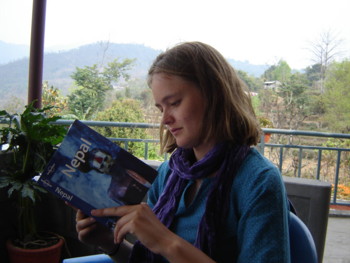

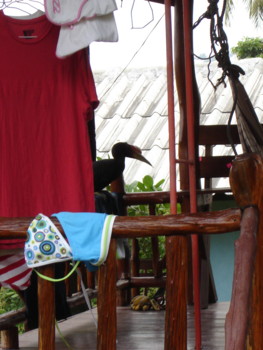 Ten days after a
Ten days after a 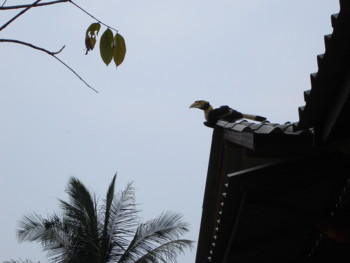 That, of course, is the problem with all worldly achievement, in the light of our eventual death. A practice of deep and repeated insight and mindfulness cuts through the veil of denial to confront us squarely with the meaninglessness of our ego-driven priorities. But that does not mean we are left with nothing, dangling helplessly, hopelessly in the void. We are left with the tool that got us to this state of realization: the practice.
That, of course, is the problem with all worldly achievement, in the light of our eventual death. A practice of deep and repeated insight and mindfulness cuts through the veil of denial to confront us squarely with the meaninglessness of our ego-driven priorities. But that does not mean we are left with nothing, dangling helplessly, hopelessly in the void. We are left with the tool that got us to this state of realization: the practice.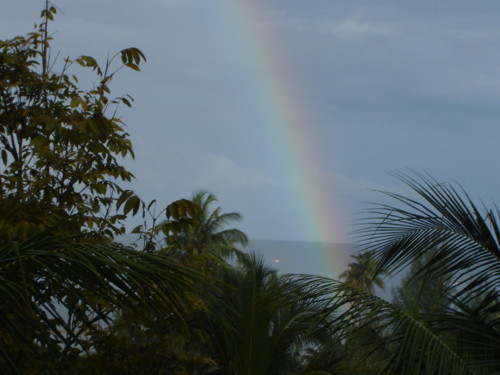


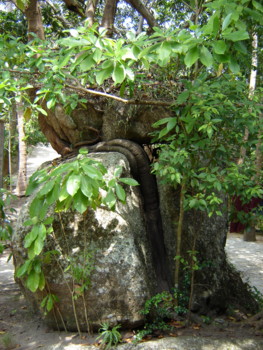
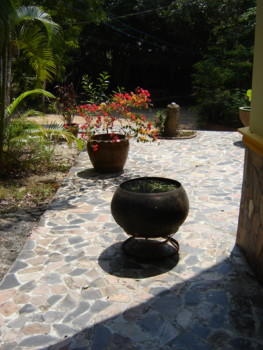

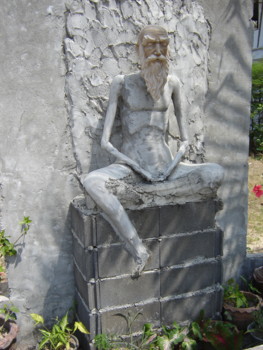
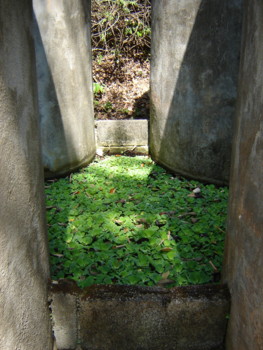
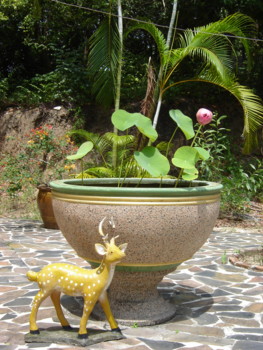
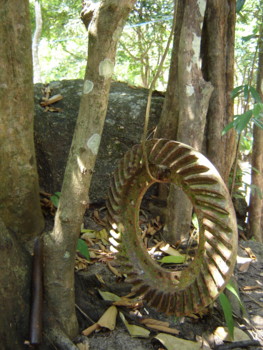
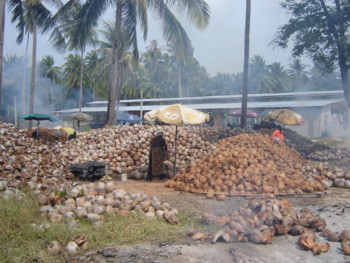 The assault to the senses is immediate as I walk from the
The assault to the senses is immediate as I walk from the 


